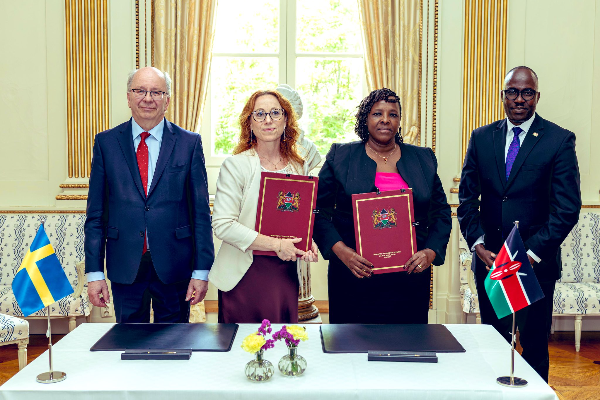
After nearly a year of negotiations, Kenya and Sweden have signed a bilateral emissions‑trading agreement under Article 6 of the Paris Agreement marking Sweden’s fourth collaboration of its kind, and promises to fuel Kenya’s green transition with vital funding and technical support.
The deal was struck on the sidelines of the ongoing UN climate negotiations in Bonn, with key representatives from both nations participating, including Sweden’s State Secretary for Foreign Affairs, Dag Hartelius; Ambassador Angeline K. Musili; Kenya’s Principal Secretary for Environment, Climate Change and Forestry, Dr Korir Sing’oei; and Caroline Asserup, Acting Director General of the Swedish Energy Agency.
Under the new agreement, the Swedish Energy Agency will work side‑by‑side with Kenya’s Ministry to develop and finance emissions‑reduction initiatives. Once implemented, these projects will generate internationally transferred mitigation outcomes (ITMOs), enabling Sweden to meet portions of its own climate targets by purchasing verified reductions from Kenya.
Sara Sundberg, Acting Head of the Climate Department at the Swedish Energy Agency, underscored the global impact of the collaboration. “Thanks to the innovative financing tool offered by Article 6… the Agency can contribute to the climate transition even beyond Sweden’s borders,” she explained.
Turning Ambition into Action
Kenya has witnessed rapid economic growth in recent years, accompanied by a sharp rise in energy demand and greenhouse gas emissions. While Nairobi has set ambitious climate goals, it faces challenges in sourcing the necessary capital to decarbonize.
“Sweden and Kenya share a long history of broad cooperation,” noted Sweden’s Ambassador to Kenya, Caroline Vicini. “Kenya pursues progressive environmental policies and has set ambitious climate goals but needs financial support to accelerate its climate transition”.
Sweden’s Climate Partnerships
Sweden has already established similar agreements with Ghana, Zambia and Nepal under Article 6, and signed memoranda with Rwanda, Switzerland and the Dominican Republic. Kenya thus becomes the latest country to join Sweden’s climate diplomacy drive.
In addition, Sweden has engaged multilaterally through partnerships with institutions like the United Nations Development Programme (UNDP) and the Global Green Growth Institute (GGGI), both set to support implementation in Kenya.
Article 6 of the Paris Agreement allows countries to cooperate through market‑based mechanisms such as ITMOs—tradable carbon credits representing real, measurable greenhouse‑gas reductions. These can be used by buying countries to meet their national commitments while helping host nations finance climate action and sustainable development.
By enabling cross-border exchanges with corresponding accounting adjustments, Article 6 avoids double counting and creates a robust framework for cooperative global mitigation efforts.
Climate Finance and Co-Benefits
Apart from emissions reductions, the Kenya‑Sweden deal is expected to deliver co-benefits such as job creation, technology transfer, emissions monitoring capacity, and broader climate resilience. It also signals investor confidence in Kenya’s environmental governance, potentially attracting further carbon market deals—such as ongoing discussions with Singapore and South Korea.
Marshall Brown, Head of Readiness at GGGI, praised the deal as “an important step towards emissions‑reduction trading under Article 6,” and confirmed GGGI’s readiness work via its Carbon Transaction Facility, scheduled to launch in July.
Scaling Up Impact
The signed agreement marks only the beginning. Next steps include identifying and developing specific emissions‑reduction projects—ranging from renewable energy, forestry and agriculture to waste management and industrial efficiency. Each activity will need to be verified and measured before being issued as ITMOs.
If successfully implemented, the initiative could become a template for Africa’s climate‑finance partnerships, leveraging Kenya’s emerging role as a carbon‑market trailblazer. With Doha‑style deal flows already underway, the country stands poised to become a major climate‑finance hub in the region.







